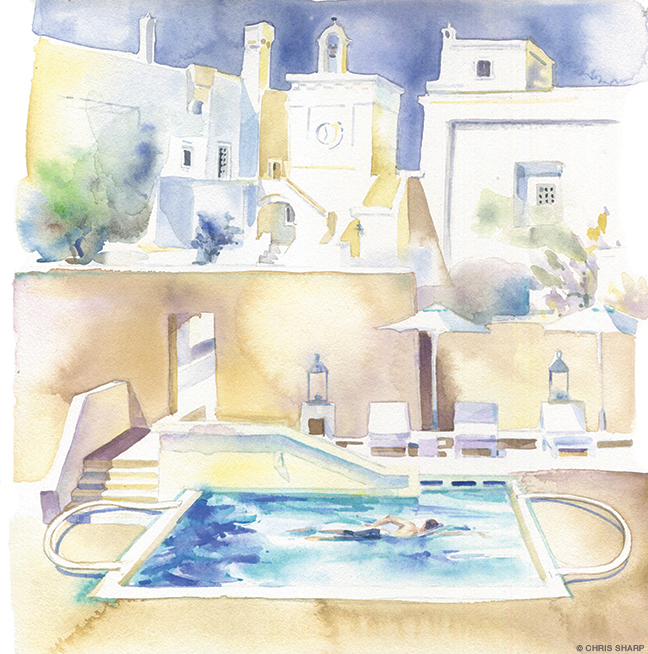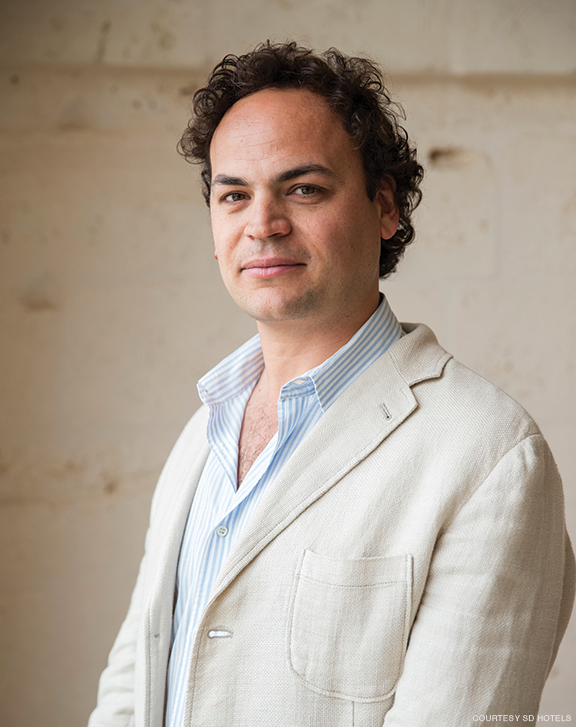
An Italian hotelier known for his opulent properties leapt into action when the COVID-19 pandemic ravaged his country.
When the Italian government announced a nationwide lockdown on March 9, Aldo Melpignano WG’05 went straight from his home in London to Borgo Egnazia, the hotel that he owns in Puglia in the country’s south.
Situated on 250 acres and designed to look like an early Renaissance Apulian village, it wasn’t a terrible place to shelter in a global pandemic. You could get lost wandering the stone alleys, secret gardens, and limestone-roofed villas. The hotel grows some of its own food, and every day during isolation, he and his family picked vegetables from the garden to cook for dinner.
But that wasn’t why Melpignano was there.

As one of Italy’s leading hoteliers, he wanted to be on the scene to make sure his company could survive as his hotels were closed. Then he knew he had to start thinking about how to reinvent tourism for Italy as a whole. “I’ve never been this busy, considering I’m not making a penny,” he said in early April.
Melpignano’s five properties—managed by his company SD Hotels—are known for their remarkable locations, mainly in Puglia. Masseria San Domenico, for example, is a five-star resort located in a 15th-century watchtower once used by the Knights of Malta. Masseria Le Carrube, a smaller hotel, is in a farmhouse with white stone walls.
During their stays, hotel guests are encouraged to interact with local people and traditions. Visitors are paired with a local advisor who recommends activities and invites them home for dinner. In April 2019, Maria Pasquale, a Rome-based food and travel writer, was surprised to find a big Apulian celebration raging at Borgo Egnazia during her stay. There was street food, folk music, and artists making ceramics. “We felt as though we had walked onto a film set,” she said.
The hotels are also known for their focus on wellness, offering healthy food, spa treatments, mindfulness sessions, and exercise programs that are both interesting and innovative—like Apulian folk dance classes in 400-year-old olive groves, or workshops on how to laugh more. “We focus on getting people to move more, come together, and be happy,” Melpignano said. “Those are the pillars of longevity.”
Melpignano was fortunate to experience this kind of happiness growing up. For holidays and summers, he traveled from Rome to Puglia, where his family owned a manor house surrounded by farmland that produced olive oil, fruits, and vegetables. “My cousins and I would play along the coast, on the rocks,” he said. “I would look for octopus and sea urchins. During harvest we would press grapes at my grandparents’ house.”
In 1996 his mother decided to turn the house into a luxury resort. “We weren’t really using this big property, and it was a pretty costly place to run,” he explained. “She had seen places in Scotland, big castles that were converted into high-end hospitality, and she thought we could do the same.” It is now Masseria San Domenico, the most exclusive property in the SD Hotels portfolio.
When Melpignano was 18, he put his education on hold to help run it. The only member of his family to speak English, he met with travel agents and operators to drum up business and recruit staff.
After attending City, University of London’s Cass Business School and working for a few years at an investment bank, he headed to Wharton to get an MBA. He loved it from the second he visited as a prospective student and his future classmates took him to a pub. During his tenure, he was copresident of the European Club and played hockey and soccer recreationally. “I didn’t have time to study,” he said. “I did well in the classes I liked and survived in everything else.”
After Penn, he stayed in the US to work at Morgans Hotel Group, before moving back home after his father acquired a plot of land in a picturesque part of Puglia along the Adriatic Sea. The family had opened two more hotels while he was away, one in London and one in Puglia, but he convinced his dad to let him use this plot of land to experiment. “My mom’s hotel was very specific. It catered to a high-end crowd, but it wasn’t for families or large groups,” he said. “I thought there was an opportunity to be a bit more contemporary and create a place for people looking for action.”
His vision became Borgo Egnazia, now SD Hotel’s 185-room flagship property representing 80 percent of the company’s business in terms of size and revenue. It opened in 2010 and is still innovating at its 10th anniversary. Next year the hotel has plans to open a school where traditional artisans can teach their crafts as well as a museum to show off Puglia’s culture.
Before Italy became one of the countries hardest hit by the coronavirus outbreak, Melpignano was in the process of opening two new properties, to “compete with the big players.” At least for now, that’s on the back burner as he focuses on more pressing concerns.
Since his hotels are well capitalized, he said he has no plans to close any permanently. In fact, he wanted them to open the minute the Italian government reopened the country. Before that, he kept full-time employees on standby by paying 80 to 100 percent of their salaries. He also purchased a ventilator and made plans to set up an emergency room at Borgo Egnazia in case of an immediate medical need.
While his hotels used to attract a high-flying crowd from around the world, Melpignano is now focused on gaining a broader domestic audience, at least in the short term. “I think people will be looking for local experiences at first,” he said. “They will be looking for secluded places.”
He’s put together long-term packages for families who want somewhere else to isolate for months, not weeks. “Because the schools will be closed until September, and people are comfortable working from home,” he said, “we think there is an opportunity to set up our properties as remote homes for people.” Long-term stays could also help promote more sustainable travel practices: if people travel fewer places but for longer, they’ll leave a smaller carbon footprint and may become more respectful of local environments.
He’s also been working with the Italian government on how to attract international travelers back to Italy in the future. “We are working on a promotional campaign and also supporting travelers who come to Italy with tax breaks. It’s all in the making.”
He doesn’t think it will be too difficult, considering the quarantine shed a light on the beautiful parts of Italy’s culture—just as his hotels do. “You could see our national unity, of people singing to one another out the window,” he said. “We showed our values to the entire world.”
—Alyson Krueger C’07

